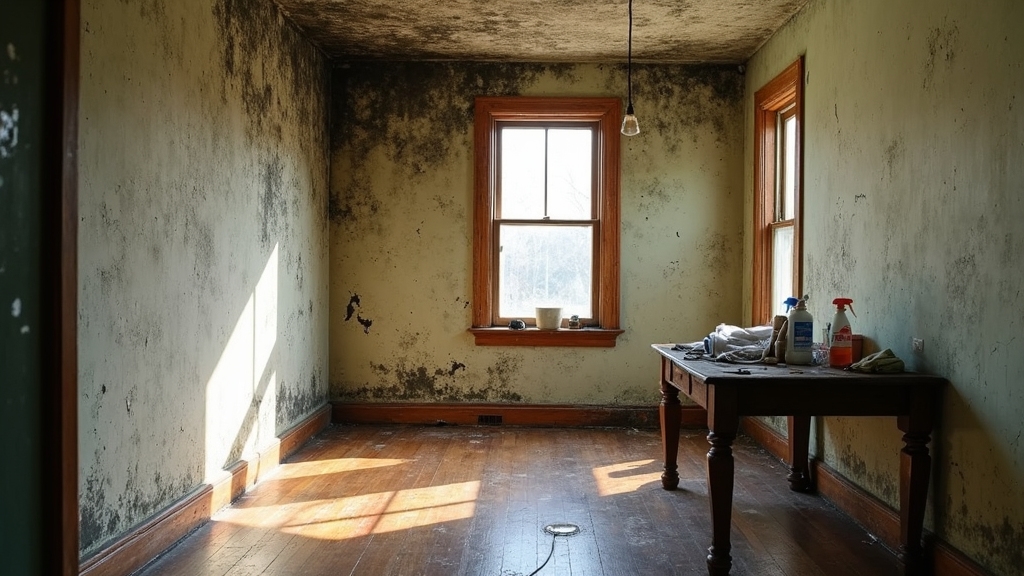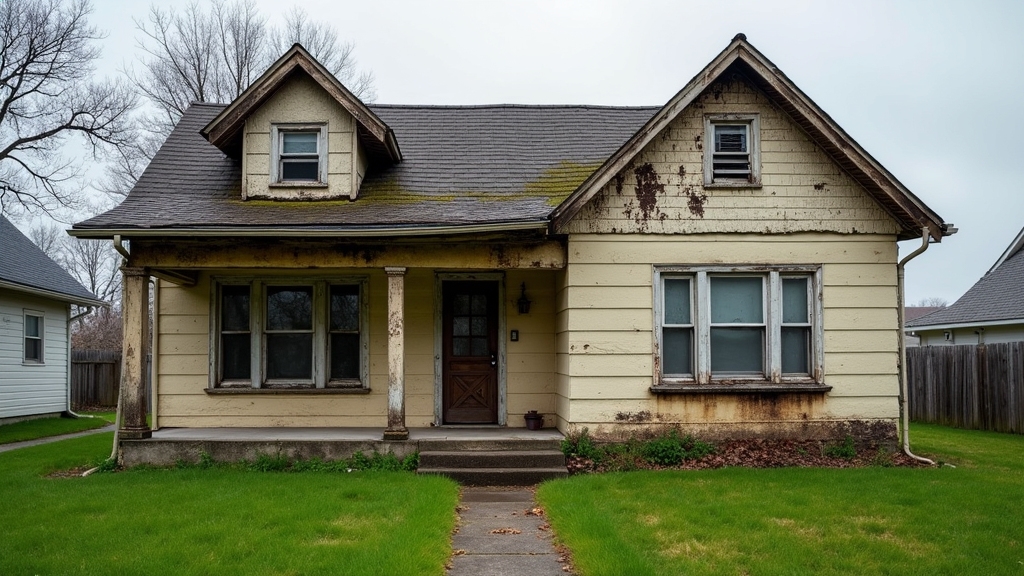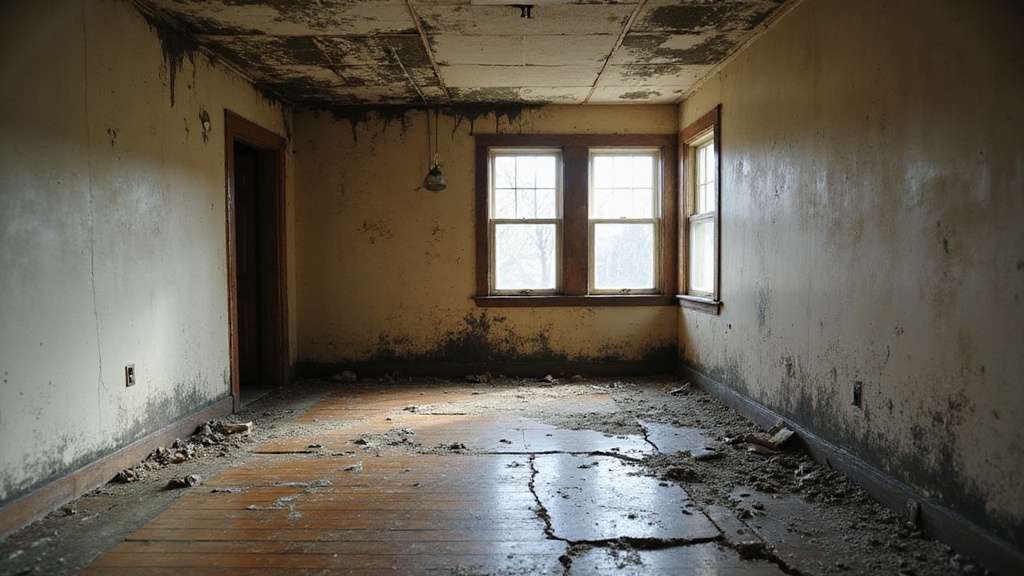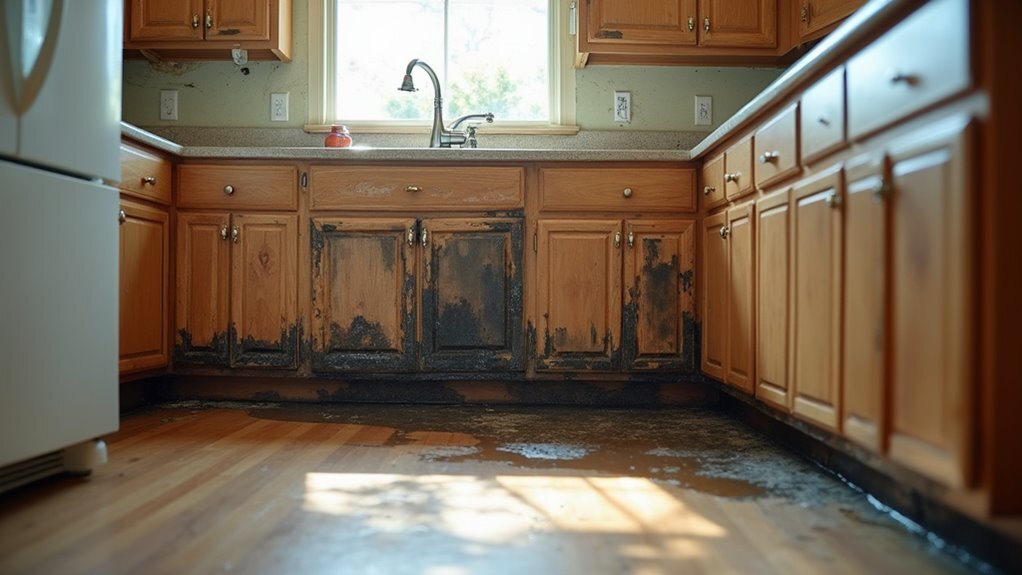Selling a house in Kansas City can be tough when you have mold issues. Buyers notice mold quickly, and it can scare them away. You need to handle this problem before you list your home.
Mold not only lowers your home’s value, but it can also cause health worries for buyers. This makes it harder to attract offers and may lead to longer time on the market.
Kansas City’s strict disclosure laws mean you cannot hide the problem. You can sell a house with mold in Kansas City by being honest, addressing the problem, and finding the right buyers.
This blog will guide you through each step and help you get the best result from your sale. We will show you how to move forward, even if your house has mold.
Key Takeaways
- Disclose all known mold issues and provide buyers with records of repairs, inspections, and professional remediation.
- Hire certified mold removal experts to address mold and underlying moisture problems before listing the property.
- Price the home accordingly, considering the cost of remediation or offer repair credits to attract buyers.
- Target cash buyers or investors open to as-is sales for a quicker, less complicated transaction.
- Work with a real estate agent experienced in mold disclosure and selling homes with property issues in Kansas City.
Understanding Mold and Its Causes

Mold forms when there is too much moisture in your home. Common causes include leaks, poor ventilation, and high humidity. Homeowners should know these sources to prevent mold before selling.
Kansas City’s humid climate and rainy seasons make mold more likely. If you have leaks or damp areas, mold can start to grow. Regular checks of your roof, foundation, and pipes help catch problems early.
Prompt repairs to leaks or condensation reduce mold risks. If you show buyers your prevention steps, they may trust your home more. Taking action now can protect your home’s value if you plan to sell.
Common Areas Mold Is Found in Kansas City Homes
Mold is often found in basements, attics, bathrooms, windows, and crawl spaces in Kansas City homes. High humidity and frequent storms create damp conditions in these areas. Homeowners should check these spots before staging or showing their home. Additionally, inspecting for public records can help identify recent property issues related to moisture or previous mold problems.
Basements usually develop mold from leaks or flooding. Attics may have mold if there are roof leaks. Poor ventilation in bathrooms is another common cause. Condensation around windows can also lead to visible mold stains. Crawl spaces often have mold due to ground moisture. Regular home inspections can help detect early signs of mold and prevent costly remediation. If you find mold early, you can fix it and avoid issues during a home sale.
Health Risks Associated With Mold

When selling a Kansas City home with mold, you need to understand the serious health risks involved. Mold exposure can trigger respiratory problems, allergic reactions, and worsen asthma, especially among children, seniors, and those with compromised immune systems. Buyers often look for reassurances that your property won’t put their family’s health at risk.
It’s important to note that not all mold is harmful, but certain types and conditions can create hazardous environments that require proper mold inspection and remediation. Properly establishing the value at inheritance through professional appraisal can also help manage potential tax implications related to the sale.
Common Mold-Related Illnesses
Mold can harm the health of people living in your house. It often causes allergy symptoms like sneezing, coughing, or itchy eyes. Some people may have worse problems, such as asthma attacks or ongoing sinus issues.
Long-term mold exposure can lead to headaches, skin rashes, or tiredness. If mold is present, these health issues may get worse over time. Children, elderly people, and those with weak immune systems are most at risk.
If you plan to sell a house with mold, you need to address these risks. Buyers in Kansas City look for past water damage and mold fixes. Early mold prevention helps protect your health and your home’s value.
Vulnerable Populations at Risk
Mold is more dangerous for some people in Kansas City than others. Children, seniors, pregnant women, and those with weak immune systems are most at risk. These groups may get serious allergies, asthma, or infections from mold exposure.
Sellers should prevent mold to protect these vulnerable people and follow Kansas City’s health rules. If you plan to sell your home, a full inspection is important. Many buyers ask for mold checks, especially if they have family members at higher risk.
Fixing mold problems before selling shows you care about safety. It also makes your house more attractive to buyers. Understanding these risks helps you create a safer home for everyone.
Legal Requirements for Disclosing Mold to Buyers
You must tell buyers if you know there is mold in your home. Missouri law requires you to share this information before selling. If you do not, you could face legal problems later.
Sellers in Kansas City must fill out a disclosure form. This form asks about water damage, mold, and anything that could cause mold. If you know about any of these issues, you must include them.
You should keep records of any repairs or cleanup done for mold. If you have inspection or lab reports, give copies to the buyer. These steps help keep the sale process smooth.
If you are not sure about local rules, check the latest regulations. Following these steps protects you and helps the buyer make a safe choice. Performing a title search can help identify any hidden issues with the property’s ownership or history that might complicate disclosure or sale procedures.
How Mold Affects Your Home’s Value

When mold is present, you can expect it to lower your home’s appraisal price and attract extra scrutiny from buyers. In most markets, buyers will use mold issues as powerful influence to negotiate for price reductions or costly repairs. Understanding these impacts lets you set realistic expectations and prepare your selling strategy.
Additionally, utilizing making moves such as cash buyers can facilitate faster sales and help you avoid prolonged negotiations related to mold problems. Recognizing the market conditions can also help you decide whether to sell quickly or wait for a better opportunity.
Impact on Appraisal Price
Mold can lower your home’s appraisal price. Appraisers in Kansas City will reduce your home’s value if they find mold. The impact can be significant, especially if you have not addressed the problem.
Appraisers look at the cost of fixing mold. They subtract estimated repair costs from your home’s value. Buyers may also worry about future mold problems.
A history of mold can hurt your home’s reputation. Some buyers avoid homes with any mold issues. Even after cleanup, your price may stay lower.
Appraisers also consider health concerns. Mold can be risky for people living in the home. If inspectors find mold, they may require more tests or repairs before closing.
If you find mold, take care of it quickly. Early action can help protect your home’s value. Always keep records of testing and repairs.
Buyer Negotiation Leverage
Buyers in Kansas City use mold issues as leverage during negotiations. Mold can lower your home’s value, even if it looks appealing. Buyers may ask for a lower price, credits, or repairs before closing.
They often compare your home to others nearby. If mold is present, buyers may push harder for better terms. This can make your home less attractive compared to similar listings.
If you are transparent about the mold problem, you may keep some negotiation power. Providing documentation of any repairs or remediation helps build trust. This strategy can support your asking price and reduce buyer demands.
Professional Mold Inspection: What to Expect
A professional mold inspection helps you know if your home has mold problems. It also guides you on what to do next. In Kansas City, hiring a certified inspector is important for accurate results.
The inspector checks the whole property for any visible or hidden mold. Air and surface samples are taken to find even small amounts of mold. The samples are sent to a lab for testing.
You will get a clear report with details about the type and amount of mold. If the report finds any issues, you can follow the inspector’s advice to fix them. The inspector will also suggest ways to prevent mold, based on Kansas City’s climate.
This inspection can make buyers feel more secure if you are selling your home. It may also help you avoid problems during negotiations. If you act on the inspector’s advice, you can keep your home safer and healthier. Ensuring proper disclosure and documentation can also be helpful if you need to address legal or insurance issues related to mold contamination.
Assessing the Extent of Mold Damage
Assessing the extent of mold damage means checking how much of your home is affected. Your inspection report will show which areas have mold. Common problem spots in Kansas City are basements, attics, and crawl spaces.
You should look at the test results and mark all the affected rooms. If the mold is only in one area, cleanup may be easier. Widespread mold in many rooms can require more repairs.
If you see signs of water leaks or poor air flow, mold is more likely to spread. These issues need fixing to prevent new mold growth. Always keep detailed records of your inspection and test results.
Buyers in Kansas City expect clear and honest information about mold damage. If you share complete details, you can avoid legal problems later. Good documentation helps build trust with buyers.
Mold Remediation Options and Costs
If you need to fix mold before selling a house in Kansas City, you have several options. Mold removal costs depend on how much mold is present. Knowing your choices will help you plan and talk to buyers.
Spot treatment costs between $500 and $1,500. This method works for small areas with limited mold growth. It is usually fast and affordable. Increased prevalence of cash transactions can make quick mold remediation appealing for sellers needing rapid solutions.
Full remediation ranges from $2,000 to $6,000. Large mold problems require more work, repairs, and prevention steps. Homeowners should prepare for higher costs if the infestation is widespread.
HVAC cleaning costs between $300 and $1,000. Mold in air ducts should be cleaned by professionals. This prevents mold from spreading throughout the house.
Some homeowner’s insurance policies may cover mold removal costs. Policies in Kansas City can vary, so check your coverage. If insurance applies, you might save money.
Always keep records of any mold work done. These documents help with legal disclosure and make buyers feel confident. Proper documentation can also support your negotiations.
Being aware of mold remediation options and costs can streamline the selling process and help you make informed decisions about your property.
DIY vs. Professional Mold Removal
First, you need to assess how extensive the mold problem is—minor surface spots and widespread damage require different approaches. Weigh the cost savings of DIY solutions against the higher price tag of hiring certified professionals in your local market.
Always consider the real risks to your health and safety before choosing a route, especially if you’re listing your home for sale. Additionally, understanding the importance of professional mold removal can ensure the problem is handled safely and effectively.
Identifying Mold Severity
To identify mold severity, first look at how much mold there is and where it is found. Mold in Kansas City homes can be serious because of humidity and basement moisture. Accurate assessment will help you decide if you need professional help.
If mold covers more than 10 square feet, you should call a professional. Mold in HVAC systems or behind walls needs expert attention. These areas can affect your home’s air quality.
Constant leaks or high humidity show a bigger moisture problem. Professionals can find and fix these issues best. If you find black mold or are unsure of the type, ask for professional testing and removal.
Assessing mold properly protects your home and its value. This can also help with future home sales. Always consider safety and the health of your family.
Cost Comparison Analysis
DIY mold removal can seem cheaper at first. Homeowners often overlook hidden costs like tools and safe disposal. If the mold returns, expenses increase.
Hiring professionals in Kansas City costs more upfront. Their services include inspection, full removal, and a guarantee. This can prevent future problems.
If you plan to sell your home, buyers expect it to be mold-free. Any visible mold may lower your property’s value. Professional removal can make your home more appealing.
Investing in expert services may help you get a better price. It can also make the selling process easier. This may lead to a stronger return on investment.
Health and Safety Risks
Mold removal in Kansas City can pose health and safety risks. DIY methods may save money but often expose you to harmful spores. Professional services use safe techniques and prevent these hazards.
DIY removal could lead to breathing problems or allergic reactions. Professionals follow local standards to find and treat all mold. They have the right equipment to handle the job safely.
Kansas City buyers usually want proof of certified mold remediation. If you hire experts, you can provide this documentation. This helps protect your property’s value.
Professional mold removal also addresses the cause of mold, like moisture problems. If you want long-term results, professionals offer better prevention. Choosing experts helps keep your home safe and healthy.
Preparing Your Home for Sale After Mold Discovery
If you find mold in your home, you need to fix it before selling. Mold can lower your home’s value and scare buyers away. Quick action helps keep your property attractive on the market.
You should hire a certified mold removal expert to clean up the problem. If there is a moisture issue, address it at the same time. Save all paperwork about repairs, as buyers may want proof of the work. Conducting a thorough market research and understanding local trends can help you price your home appropriately after repairs.
Next, improve your home’s first impression by trimming bushes and washing the outside. A tidy entryway can make buyers feel welcome. If your home looks cared for, it stands out to buyers.
Inside, clean each room well and remove any bad smells. Staging your home can help show off its best features. If buyers see a clean, fresh space, they will feel more confident about your home.
Additionally, understanding the importance of timing can influence how quickly and successfully you sell. If you follow these steps, buyers will see you handled the mold problem responsibly. This can lead to an easier and quicker sale.
Marketing a House With Mold Issues
When selling a house with mold issues, you must be honest about the problem. Buyers need to know what to expect before making an offer. Clear information helps attract buyers who are ready to handle repairs.
You should always tell buyers about any mold in the home. Kansas law requires sellers to share known problems with potential buyers. If you do this, you build trust and avoid legal trouble.
If the home has been treated for mold, show buyers the proof. Professional cleanup records can make buyers feel more confident. These documents show that steps have been taken to solve the problem.
A clean and tidy home always makes a better impression. You can remove clutter and add simple decorations to make the spaces look fresh. Even with mold issues, a neat house can attract serious buyers.
If you highlight the neighborhood’s best features, you can shift focus from the mold. Good schools, parks, and local shops may appeal to buyers. Buyers looking for a deal or investment may see potential in the home.
Being aware of hidden damage like mold and addressing it openly can help you sell the house more smoothly and prevent future disputes.
Working With Real Estate Agents Experienced in Mold Sales
You’ll want a real estate agent who knows the ins and outs of selling homes with mold issues, as their expertise directly impacts your results. They’ll help you navigate strict disclosure requirements unique to your market and ensure you stay compliant. With the right agent, you can confidently negotiate mold-related offers and protect your bottom line.
Agent Mold Expertise Matters
A real estate agent with mold experience can help you sell your house more easily. They know how to handle mold concerns and answer buyer questions. If you want a smooth sale, an agent with this expertise is a good choice.
Such agents understand the Kansas City market well. They can suggest small upgrades that make your home look better to buyers. If buyers are worried about mold, these agents can address those concerns directly.
An experienced agent will show buyers similar homes that have sold with mold problems. The agent can also use marketing that targets people open to fixing issues. If you need to set a fair price, the agent will help you choose one that fits the local market.
Navigating Disclosure Requirements
Kansas City sellers must follow clear mold disclosure rules. Missouri law says you must tell buyers about any known mold issues. You also need to disclose past or current mold and any fixes you have made.
Agents help you fill out these forms correctly. They make sure you include details about repairs or renovations linked to mold. If you have had mold removed, agents will suggest including the receipts and inspection reports.
Proper documentation protects you from legal problems later. Buyers trust sellers who are open about the property’s condition. Agents also help you show improvements you have made after any mold issues.
Negotiating Mold-Related Offers
If you get offers on a Kansas City home with a mold history, work with an experienced real estate agent. The agent will help you handle buyer concerns about mold. They will also guide you in showing recent repairs to improve your position.
Recent upgrades like mold resistant paint or new materials should be highlighted. Buyers may ask for repair credits, so set fair amounts for any future work. Inspection contingencies must be clear to avoid unfair contract cancellations.
If you want to reduce your responsibility after the sale, consider selling the home as-is. The agent can negotiate these terms for you. This approach limits your obligations after closing the sale.
Negotiating Offers When Mold Is Present
Mold can lower a property’s value and make buyers hesitant. If you have mold, buyers in Kansas City might ask for a price cut or credit. Sellers should show proof of any mold inspection or cleanup done.
Other home features, like a new kitchen or a well-kept yard, can help balance buyer concerns. When you respond to offers, use sales data from similar homes with and without mold. Always be honest about the mold but point out the home’s strengths and the actions you have taken.
If you stay open to solutions, negotiations can keep moving forward. Flexibility helps you achieve a better result, even with mold present.
Selling As-Is to Cash Buyers or Investors
Selling your Kansas City home as-is to cash buyers or investors can be a quick solution. If you want to skip repairs or long talks, this method works well.
Cash buyers often accept homes with problems, including mold. Selling your Kansas City home as-is to cash buyers lets you avoid repairs and sell quickly, even if there are issues like mold.
You can make your home more appealing without spending much. Simple landscaping, such as mowing and trimming bushes, helps attract investors. Removing clutter and extra furniture lets buyers see the space better.
If you clean and arrange rooms, your home will look its best, even if you sell as-is. Always tell buyers about any mold issues. Honest disclosure avoids legal trouble and helps build trust.
This approach can make selling your home in Kansas City easier and faster.
Conclusion
If you need to sell a house with mold in Kansas City, you have several options. If you address the mold and follow disclosure laws, you can attract traditional buyers. If you choose to sell as-is, you may avoid repairs and still find interested investors.
If you want a faster, less stressful process, you can sell your house for cash. If you work with experienced buyers, you can close quickly and avoid extra costs. If you want to skip showings and repairs, a cash sale might be the best solution.
If you are ready to move forward, we can help. If you contact Limitless Homes of KC, we will make a fair cash offer for your home. Let us help you turn your mold problem into a fresh start.

